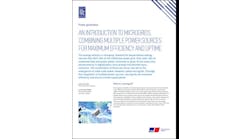Husk Power Systems, which operates a large fleet of community solar microgrids across Africa and Asia, has set an ambitious new goal to build at least 500 microgrids by 2026 and bring renewable energy to 2 million Nigerians.
In what it is calling the Nigeria Sunshot Initiative, the company intends to not only build the microgrids, but also help Nigerians put the reliable power to use for socioeconomic development. For example, Husk Power plans to provide financing to help Nigerians purchase energy efficiency appliances and wants to catalyze the rollout of agri-processing, cold storage and other productive uses of the microgrid power.
Husk Power wants to use the community solar microgrids to buttress federal electrification goals. The Nigerian government says microgrids are the least-cost technology for 8.9 million of the 19.8 million additional connections needed in the country to achieve universal electrification. The Sunshot Initiative can provide about 5% of those connections, impacting 1% of the total Nigerian population, according to Husk.
“Husk Power will do its utmost to support federal, state and local governments to deliver on Nigeria’s goal of universal electrification by 2030,” said Olu Aruike, country manager of Husk Nigeria. “With more than 90 million Nigerians still living without access to energy, the Nigeria Sunshot is a real-world demonstration that the microgrid industry is ready to scale and drive rural economic growth with a net-zero, resilient solution.”
In addition to building at least 500 microgrids over the next four years, Husk intends to:
- Establish 400,000 connections that benefit over 2 million people.
- Take at least 25,000 diesel and gasoline generators offline.
- Provide affordable energy to 8,000 women-led business customers.
- Electrify 700 public health clinics and 200 private hospitals as well as 100 public schools.
Earlier this year, Husk Power made Microgrid Knowledge’s 22 intriguing microgrid projects to watch in 2022 for its simultaneous development of six new microgrids in Nigeria as part of a rural electrification program backed by the World Bank. The projects show the considerable possibilities available from the scaling up of microgrid rollout programs.
Located in Nasarawa State, the solar hybrid microgrid projects are designed to provide clean, reliable and affordable electricity to about 5,000 households and 500 businesses. For six communities in the Doma and Lafia local government areas, the microgrids mean access to electricity for the first time. Communities benefiting are Rukubi, Idadu and Igbabo in Doma and Kiguna, Akura and Gidan Buba in Lafia.
Scaling up in Nigeria, Africa’s largest economy, is just the start for Husk Power. The company, which has offices in Fort Collins, Colorado, as well as Tanzania, Nigeria and India, is in discussions to enter multiple new markets in Sub-Saharan Africa. Husk has committed to a 2022 UN Energy Compact to build 5,000 microgrids by 2030.
Watch Manoj Sinha, founder and CEO of Husk Power Systems, discuss global drivers for microgrids in a video interview with Microgrid Knowledge.







